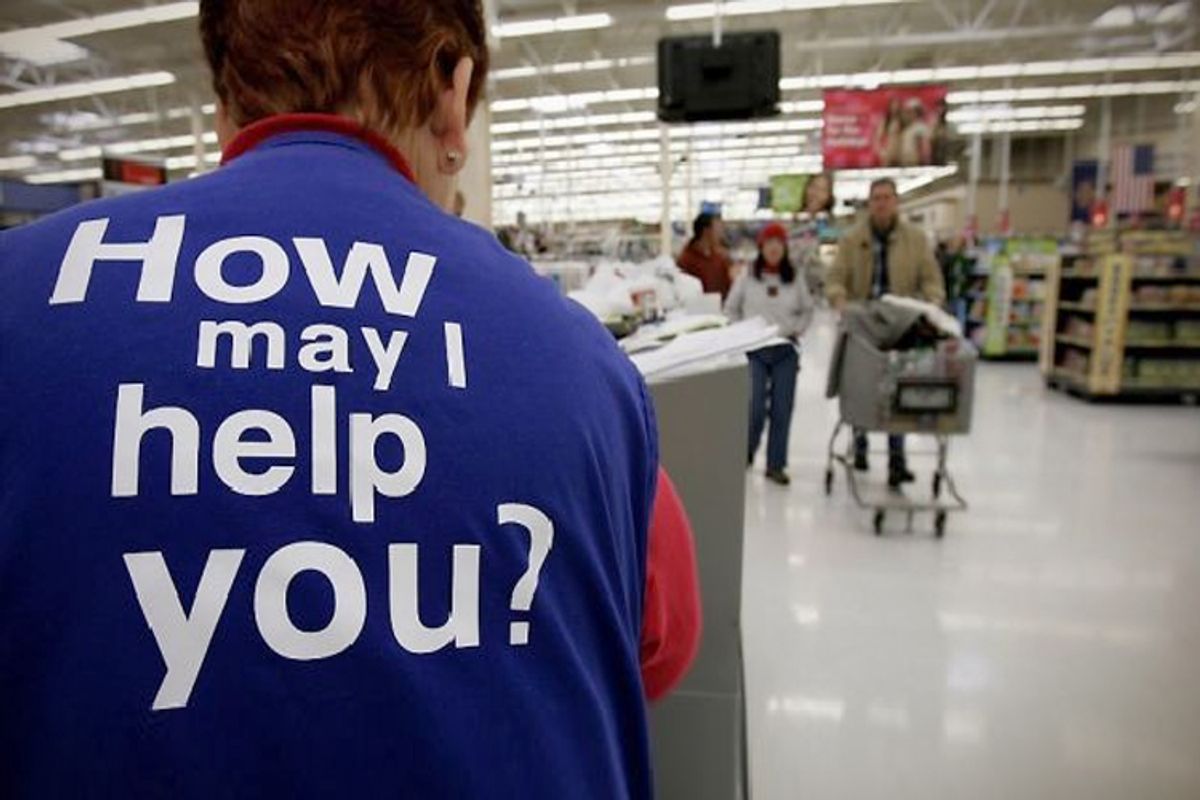When Tiffany Beroid went public with her story earlier this year, the uninitiated received a glimpse of how brutal Wal-Mart’s treatment of pregnant workers can be per their policies on pregnancy. Beroid, a Wal-Mart worker in Maryland, was refused any modification to her duties or accommodation for her high-risk pregnancy, even after she presented medical documents confirming the nature of her pregnancy. At the end of her ordeal, Beroid lost a shot at a nursing degree and endured extraordinary stress on her marriage due to the increased demand on her husband to work – and Wal-Mart did everything it could to hush the story up.
But more workers with pregnancy nightmare stories involving the retail giant eventually came forward, and last month the Washington Post reported that Wal-Mart would be “upgrading” its policy on pregnant workers:
On March 5th, the company issued a new policy, which says that women "may be eligible for reasonable accommodation" if because of a "temporary disability caused by pregnancy" they "need assistance to apply for a new job, or to perform the essential functions of a job." In theory, that means that pregnant Wal-Mart employees are more likely to be given less physically demanding work if they're having difficulty carrying out their duties.
Given Wal-Mart’s history of dealing unconscionably with its own workers, many employees and watchdog groups were unimpressed with the "improvement," and worried that the policy wouldn’t go far enough to protect pregnant workers from the sort of maltreatment Beroid and others endured. That the language of the new policy can be interpreted to account for treatment virtually identical to that which was allowed before is likely true, but the language does more than provide an unreasonably elastic parameter for the abuse of pregnant workers. Rather, it belies an attitude toward pregnancy that explains Wal-Mart’s position on handling pregnant workers all along that now remains unchanged: Pregnant workers differ from non-pregnant workers insofar as they can provide more or less utility for Wal-Mart.
To the dry-eyed realist this probably seems fair enough; all employees are, at the end of the day, of interest to their employers only insomuch as they provide value to the firm. And yet society does contain provisions for special categories of people that can’t be explained in terms other than moral value. Take, for example, veterans: As part of an ongoing pledge to support veterans, Wal-Mart has employed more than 42,000 returning members of the armed forces, and has promised to raise another $20 million for programs supporting veterans and their families.
There’s no material reason veterans make better candidates for employment at Wal-Mart than any other candidate, especially for the low-skilled labor being performed on the floor of retail shops. And yet Wal-Mart’s commitment to veterans doesn’t seem entirely out of line, as veterans are seen as people with a different moral standing than others: They have contributed something of value, and therefore are valued.
Wal-Mart notably doesn’t categorize pregnant women in that same class of morally valuable person. Benefits and accommodations in work are not offered to pregnant women insofar as they are pregnant, but only insofar as they are disabled in a medical sense by the effects of pregnancy. In other words, pregnancy has simply been subsumed under the preexisting criteria of disability rather than granted its own category of consideration. This not only means the protections intended for pregnant workers may not cover run-of-the-mill but nonetheless difficult aspects of pregnancy, but also that the authorities at Wal-Mart, being consummate capitalists, are participating in yet another degradation of human life in favor of moneyed interests.
After all, pregnant women are at the final analysis socially valuable and morally distinct as a category of person. They ensure the ongoing life of society, and do so at personal cost: sometimes great, sometimes minor. If Wal-Mart is willing to recognize the moral significance of veterans in those terms, why not pregnant women? The answer in that case would be to simply recognize pregnancy as a discrete category worthy of its own set of special labor protections not because pregnant workers offer any extra utility, but simply because pregnancy is a morally significant vocation.
And it won’t happen. Not because it couldn’t, but because Wal-Mart won’t sacrifice potential profit for the social value or moral import of a person unless it can be turned into a P.R. stunt. There is a reason that when Pope Francis speaks of a culture of death he also often speaks of economies of exclusion; the preference for profit over people and material objects over human life is a symptom of the melding of the two impulses, which are joined by a similar extreme undervaluing of life. Firms and the economy as a whole are here to serve humanity, not to be served by it; to reverse that order is to invite incredible harm, and Wal-Mart is in many senses the very manifestation of that injurious reversal.

Shares